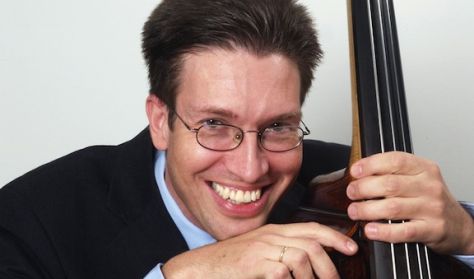This year’s Edinburgh International Festival saw the Budapest Festival Orchestra and their acclaimed conductor Iván Fischer return to the city; performing what was to be a celebrated Marriage of Figaro, as well as several chamber concerts and Mozart’s Requiem and The Prague Symphony. We were able to catch up with double bassist Zsolt Fejérvári a couple of weeks ago, and asked him what it is that he finds so special about taking part in the EIF.
How many times have you been to the EIF before?
This is the fourth time – at least I think so! This is the first time we are doing an opera, so it’s a special occasion for us.
You mentioned opera then [the Marriage of Figaro] – can you tell me why you think it’s such a great thing to perform?
Well, especially because we are doing Mozart, and it’s always a very special occasion. We are doing [for the last 6 years] every year a Mozart opera, and I am absolutely convinced…We have done already Don Giovanni, Cosi Fan Tutti and last year The Magic Flute – and I’m absolutely convinced that playing Mozart’s operas helps the orchestra, and the orchestra’s members, to play better the music of this era. I feel this is because in this period, the text and the opera were generally a much more important part of the music than later in the Classical period. And it seems to me that, when we are doing this Mozart project, the orchestra plays much more articulated the other classical pieces – Haydn, Mozart and even Schubert.
Will you be playing in all three performances (the opera, the Mozart concert, and the Queen’s Hall concerts)?
I won’t be participating in the chamber concerts this year, but every time we come, we make a point of playing a chamber concert. I especially prefer it. Chamber music is a very important part of the orchestra’s life, and I think it’s very important to the vision of Ivan [the conductor] – and to how the orchestra evolves.
Do you prefer playing smaller chamber pieces or larger orchestral works?
Both play an important part in a musician’s life so I think really, a balance is important.
How long have you been playing with the Festival Orchestra?
We are a little bit built up like some UK orchestras – so we have about 60 people who are full-time parts of the orchestra, and then there are also freelancing people, so it has to be more flexible than traditional orchestras. And these people who are freelancing, they are also linked in an emotional way to the orchestra.
There are quite a few training groups for the BFO – is it important to get young people involved from an early age?
Absolutely, yes.
Is there anything that you really enjoy about Edinburgh, that you look forward to every time you visit?
It’s a mixture of these great cultural metropolitan events, and also a mixture of something very human. It’s not a huge, huge city. We were in South America a few weeks ago and really, the size of the cities – Sao Paulo, or Rio for example – it is terrifying! So Edinburgh, really, it’s a very special place.
How does it compare to the Budapest festival?
I would say that the Edinburgh International Festival is the greatest in Europe – certainly, it’s not comparable to any other!
